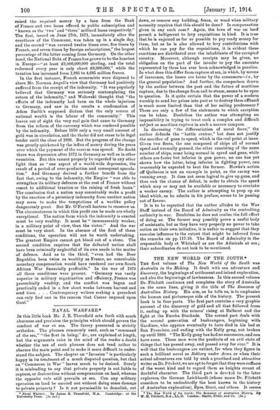NAVAL WARFARE.*
In this little book Mr. J. R. Thnrsfield sets forth with much clearness and precision the principles which should govern the conduct of war at sea. The theory presented is strictly orthodox. The phrases commonly used, such as "command of the sea," "the fleet in being." &e., are explained at length, but the arguments raise in the mind of the reader a doubt whether the use of such phrases does not tend rather to obscure the main point and to make it more difficult to under- stand the subject. The chapter on "Invasion" is particularly happy in its treatment of a much disputed question, but that on "Commerce in War " leaves much to be desired. Surely it is misleading to say that private property is not liable to capture, or destruction without compensation on land, whereas the opposite rule still prevails at sea. Can any military operation on land be carried out without doing some damage to private property P Is it not permissible to demolish, cut • Nasal Warfare. By Jame. R. Thurefiell, M.A. Cambridge: at the University Yuen. El.. net.] down, or remove any building, fence, or wood when military necessity requires that this should be done? Is compensation given in any such case P Again, the laws of war on land permit a belligerent to levy requisitions in kind. It is true that he is enjoined as far as possible to pay ready money for them, but as he is, also allowed to levy contributions with which he can pay for the requisitions, it is evident theme exactions are distributed over the inhabitants of the occupied country. Moreover, although receipts may be given, no obligation on the part of the invader to pay the amounts, represented by them has ever been acknowledged in practice. In what does this differ from capture at sea, in which, by means of insurance, the losses ore borne by the consumers—i.e., by the general population And further, the comparison drawn by the author between the past and the future of maritime capture, due to the change from sail to steam, seems to be open to question. Is it quite certain that the power of a modern warship to send her prizes into port or to destroy them offhand is much more limited than that of her sailing predecessor ? These are only a few of the statements to which exception can be taken. Doubtless the author was attempting an impossibility in trying to treat such a complex and difficult subject as maritime capture in such a narrow compass.
In discussing "the differentiation of naval force," the author defends the " battle cruiser," but does not justify the sacrifice of guns to speed, which is the real point at issue. Given two fleets, the one composed of ships all of normal speed and normally gunned, the other consisting of the same number of ships, some being normal in speed and guns, while others are faster but inferior in gnu power, no one has yet shown bow the latter, being inferior in fighting power, can reasonably be expected to beat the former. Hawke's action off Quiberon is not an example in point, as the enemy was running away. It does not seem logical to give up guns, and thus risk the chance of defeat, in order to obtain the speed which may or may not be available or necessary to overtake a weaker enemy. The author is attempting to prop up an ideal which, as he admits in his preface, seems to be passing out of fermis..
It is to be regretted that the author alludes to the War Staff instead of the Board of Admiralty as the controlling authority in war. Doubtless be does not realize the full effect of doing so. The former may possibly prove a useful body of assistants, but as they have very properly no power to take action on their own initiative, it is unfair to suggest that they exercise influence to the extent that might be inferred from the remarks on pp. 117-18. The Board of Admiralty is the responsible body at 'Whitehall as are the Admirals at sea; their subordinates do not look to be mentioned.










































 Previous page
Previous page